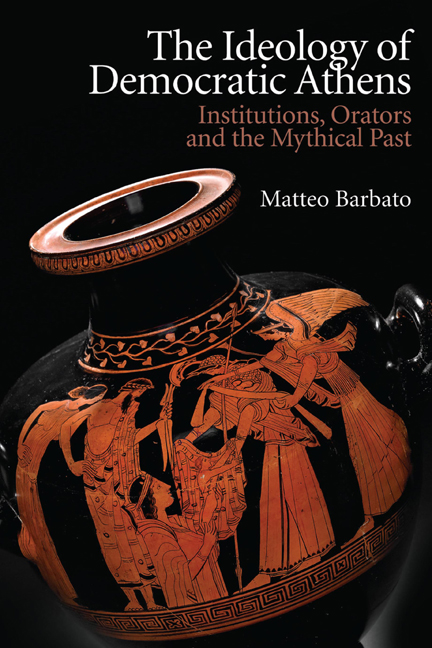Book contents
- Frontmatter
- Contents
- List of Tables and Illustrations
- Preface
- Abbreviations
- 1 Introduction
- 2 Myth and Athenian Democracy
- 3 The Discursive Parameters of Athenian Democratic Institutions
- 4 Exclusiveness and Eugeneia in the Myth of Autochthony
- 5 Between Charis and Philanthrōpia: The Heraclidae
- 6 Fading Shades of Hybris: The Attic Amazonomachy
- 7 Combining Hybris and Philanthrōpia: The Myth of Adrastus
- 8 Conclusions
- Bibliography
- Index Locorum
- General Index
4 - Exclusiveness and Eugeneia in the Myth of Autochthony
Published online by Cambridge University Press: 17 October 2020
- Frontmatter
- Contents
- List of Tables and Illustrations
- Preface
- Abbreviations
- 1 Introduction
- 2 Myth and Athenian Democracy
- 3 The Discursive Parameters of Athenian Democratic Institutions
- 4 Exclusiveness and Eugeneia in the Myth of Autochthony
- 5 Between Charis and Philanthrōpia: The Heraclidae
- 6 Fading Shades of Hybris: The Attic Amazonomachy
- 7 Combining Hybris and Philanthrōpia: The Myth of Adrastus
- 8 Conclusions
- Bibliography
- Index Locorum
- General Index
Summary
Among all Athenian civic myths, autochthony was probably the most representative of Athenian identity, and held a special place in Athenian ideological practice. By claiming to be indigenous inhabitants of Attica, born from the very soil of their own land, the Athenians could reinforce their identity and civic cohesion, and at the same time mark their difference from and superiority over the rest of the Greeks. It has been traditionally assumed that the Athenians developed this view at an early stage, when they pictured themselves collectively as indigenous and born from the earth. A fruitful scholarly trend inaugurated by Vincent Rosivach has convincingly shown that this was not in fact the case. The complete notion of autochthony only came about around the middle of the fifth century from the combination of two separate traditions: the early myth of Erechtheus/Erichthonius’ birth from the earth, and the Athenians’ belief that they had inhabited Attica from time immemorial.
The earliest mention of the earthborn Erechtheus is in the ‘Catalogue of Ships’ in the Iliad. The poet defines Athens as ‘the land of great-hearted Erechtheus’ (δῆμον Ἐρϵχθῆος μϵγαƛήτορος), and recalls how Erechtheus had been engendered by the earth (τέκϵ δὲ ζϵίδωρος ἄρουρα) and entrusted to the care of Athena. The goddess then placed him in her sanctuary, where the Athenians honoured him with yearly sacrifices (Hom. Il. 2.546–51). A further Homeric reference to Erechtheus can be found in Book 7 of the Odyssey, where Athena leaves Scheria for Marathon and Athens and enters the palace of Erechtheus (Hom. Od. 7.77–81). The Homeric epics therefore clearly establish a special connection between the earthborn Erechtheus and the goddess Athena. The designation of Athens as the land of Erechtheus, however, does not necessarily imply the Athenians’ direct descent from the hero or their participation in his earthborn quality, as much as the importance of Erechtheus in Athenian cult from an early date.
Scenes depicting Erichthonius’ birth start to appear on Attic vase painting in the early fifth century.
- Type
- Chapter
- Information
- The Ideology of Democratic AthensInstitutions, Orators and the Mythical Past, pp. 82 - 114Publisher: Edinburgh University PressPrint publication year: 2020



